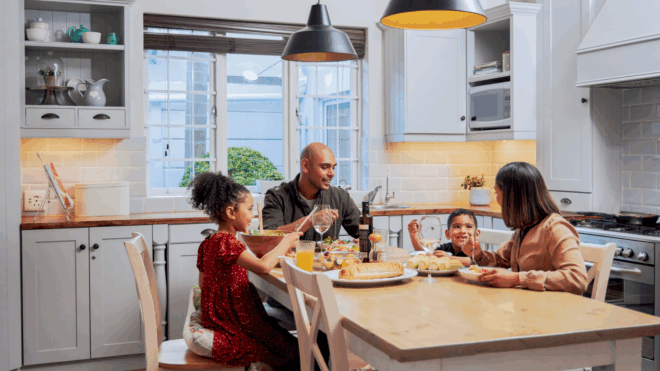To say that my ex-husband and I don't get along is a bit of an understatement. Sometimes I hear about those exes who discover they actually can be friends after a divorce, and effectively co-parent their children together. Um, what's that like? I have no idea.
The tricky part is that we have joint custody of our two school-aged daughters. It's a 50 percent split — equal time with each parent. You'd think we'd have to come together and co-parent for our kids, display a united front, make decisions together, etc, but we don't.
We don't co-parent; we parallel parent, and that's a whole other ball game.
It's been two years since we've split, and despite my efforts to form a friendship with my kids' dad, it's just not working. For whatever reason, he has explicitly stated that he cannot and will not be friends with me. He's generally nice (albeit standoff-ish) to my face on the very few occasions we have to actually interact, but that's where it ends.
As for our kids, here's what happens:
We don't have conversations about the girls other than when we absolutely have to meet with one of their teachers or a therapist. We don't sit together at school functions. We don't have dinner as the four of us anymore — ever. We even arranged it so that we barely have to have any contact. Every Monday morning, one of us drops them off at school, and the other one picks them up that afternoon.
More from The Stir: Divorce Hasn't Changed My Ex-Husband Into the Man I Want Him to Be
We live completely parallel lives, to the point where our kids rarely talk to their dad when they're with me, and vice versa. That means I usually go a week at a time without talking to my babies, which is harder some weeks than others, but the flip side is that I don't have to interact with him on my weeks with them.
It may sound like a tragedy, but it works for us, and the kids are fine. I'm sure they'd much prefer parents who could be friends, but they probably wish they had parents who could've stayed married even more. Sometimes it's just not possible, and you have to work with what you've got.
We didn't plan on this, or come up with some grand master scheme with a court-appointed mediation counselor … we just sort of fell into it organically. It's what happens when every conversation is tense, wildly uncomfortable, and full of accusations and passive-aggressiveness.
How does it work? We just trust each other to keep the kids healthy, safe, and get them to school on time. That's it. I think he's overly strict with them, and he got peeved when I let our 11-year-old read Twilight and The Hunger Games. He doesn't allow sugar cereal; I toss Pop-Tarts at them in the car on the way to school. We go to churches of different denominations. Santa doesn't visit his house, and the kids aren't always in bed by nine at mine.
More from The Stir: How My Divorce Made Me a Better Mom
We have learned to let it go when the other parent does something that we don't see eye-to-eye on.
Which is basically everything. We even have a mantra — what happens at Daddy's house stays at Daddy's house, and what happens at Mommy's house stays at Mommy's house. It's beyond frustrating to deal with certain aspects of his parenting that I don't agree with, but it's much healthier for the kids to say, "Daddy has his own way of doing things," instead of, "Your dad's a jerk."
He's really not a jerk when it comes to our daughters. It's just that our parenting styles are as incompatible as our personalities, so we have to agree to disagree, and do things our own way when we're the custodial parent.
Of course conflicts will arise that cannot be brushed off. Our daughter had recently decided that she didn't want to go on her sixth grade class trip, but my ex was insistent that she go. He thought it would be good for her, build character, and was deeply afraid that she'd eventually regret not going.
I wanted her to go too, but seeing how adamant and articulate she was about not wanting to, I thought it would be a good learning experience. Yes, she'd likely regret not going, but what a great opportunity to learn the consequences of decision making.
Thankfully I have a therapist worth his weight in gold, and we managed to come up with a solution for that quandary without actually having to reach an agreement about it. My ex, my daughter, and I all get one big trump card, something that we can use to supersede each other in order to get what we want. Her dad decided to play his card and make her go on the trip, but she knows that she has a big "get out of jail free" card in her back pocket. I know I'll be able to play mine at some point in the future, perhaps to allow her to participate in an activity he'd ordinarily disapprove of.
More from The Stir: 7 Things I Got Wrong About Being a 'Good Wife'
She feels reassured that she'll be able to say no to something he feels strongly about her doing in the future, and he is satisfied that she is going on the camping trip. Mostly I just feel grateful for the reminder of oh that's why we got divorced.
Of course it would be great if we could level with each other and figure out parenting solutions together, but that's only possible when you at least share some of the same philosophies. Traditional co-parenting just isn't an option with some couples, when neither parent is willing to concede enough to come to a mutual agreement about something.
This arrangement allows our kids to have healthy, loving relationships with both of us, without them having to be in the middle of our constant, harmful conflict.
Yes, it's hard, but at the end of the day, this is what's best for them, and that's all that matters. And who knows? Maybe someday my ex will decide he can be friends with me after all. Heh — I won't hold my breath.
How do you handle co-parenting? Could you parallel parent?
Image via © Wavebreak Media Ltd./Corbis




